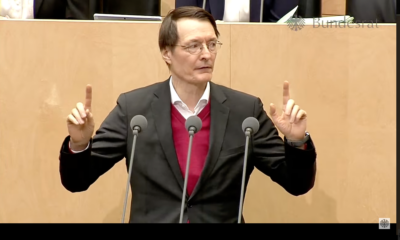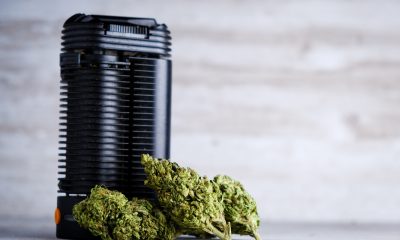The US Department of Health and Human Services (HHS), has recommended that cannabis be classed as a lower risk drug. Here’s what this means for research, industry and consumers.
A leaked letter, seen by Bloomberg News and dated Tuesday 29 August, reveals that the HHS has recommended that the Drug Enforcement Administration (DEA) reclassify cannabis from a Schedule I to a Schedule III under the Controlled Substances Act (CSA).
This would mean that it would no longer be classed as a ‘high risk’ drug alongside the likes of heroin, LSD and ecstacy.
Schedule I drugs are defined as substances, or chemicals with ‘no currently accepted medical use and a high potential for abuse’.
Schedule III substances tend to be FDA-approved drugs that are available on prescription such as anabolic steroids, ketamine and Tylenol with codeine, defined as ‘moderate to low potential for physical and psychological dependence.’
The recommendation comes 10 months after President Joe Biden announced he was calling on federal agencies to review how cannabis is classified, as well as his intention to pardon thousands of offences related to possession.
In a Twitter post at the time, President Biden said: “We classify marijuana at the same level as heroin – and more serious than fentanyl. It makes no sense. I’m asking the Secretary of Health and Human Services and the Attorney General to initiate the process of reviewing how marijuana is scheduled under federal law.”
Bloomberg reports that a ‘top official’ at the HHS has written to DEA administrator, Anne Milgram, calling for marijuana to be reclassified as a Schedule III drug. The HHS later confirmed the decision, saying it was made as a result of following the ‘data and science’.
The DEA, which has the final authority on the scheduling or rescheduling of drugs, will now launch its own review, according to a spokesperson.
In a statement following the news, deputy director of US cannabis advocacy group, NORML, Paul Armentano, described the process as ‘far from over’.
“It will be very interesting to see how DEA responds to this recommendation, given the agency’s historic opposition to any potential change in cannabis’ categorisation under federal law,” he said.
“Further, for decades, the agency has utilised its own five-factor criteria for assessing cannabis’ placement in the CSA — criteria that as recently as 2016, the agency claimed that cannabis failed to meet. Since the agency has final say over any rescheduling decision, it is safe to say that this process still remains far from over.”
What does this mean for the cannabis sector?
If completed by the DEA, the rescheduling could have major implications for the cannabis sector.
The US Cannabis Council said the move would be the ‘most significant’ federal cannabis reform in modern history, effectively declaring an end to President Nixon’s ‘failed’ war on drugs.
While it would still remain federally illegal, reclassifying it as a Schedule III drug would remove some of the major barriers currently preventing research on the plant and the development of new treatments.
While cannabis for adult-use and/or medicinal purposes has been legalised in 38 US states to date, its federal status has hampered the ability to build the evidence base for its therapeutic potential, making it harder to access research grants and carry out large-scale trials.
It would also make it easier for companies to operate in the space, lifting some of the restrictions currently placed on those in the industry, such as being able to access banking services. According to some reports, the rescheduling would remove the current 280E tax provision on cannabis companies, which prevents them being able to claim standard business tax deductions on their federal returns, and may allow public companies to list on major exchanges such as Nasdaq and the New York Stock Exchange.
A report published this week by Prohibition Partners, estimates that – based on the projections of just three licensed cannabinoid treatments – global sales within the pharmaceutical cannabis industry could reach approximately US$1.11 billion in 2023, with projected growth to US$1.37 billion by 2027.
“The HHS recommendation further splits the path of cannabis between adult-use and medical purposes. This helps advance access, but also opens the door for the existing healthcare and pharmaceutical industry to embrace patient demand,” commented Stephen Murphy CEO of Prohibition Partners.
“The just-published The Pharmaceutical Cannabis Report: 3rd Edition highlights the path forward for cannabis and the explosion of clinical research and development that will be further enhanced once this recommendation comes to fruition.”
Meanwhile, the acknowledgement of its medicinal use may also mark a shift in how cannabis is viewed by society, reducing the existing stigma around its use.
“Cannabis should have never been scheduled alongside heroin and placed at the center of our nation’s destructive drug war. Thankfully that era is coming to a close and is being replaced by a modern and scientific approach to regulating this plant,” the US Cannabis Council said in its statement.
“The US Cannabis Council is committed to full legalisation of cannabis. We believe that rescheduling is a historic step toward that ultimate goal. Rescheduling will have a broad range of benefits, including signalling to the criminal justice system that cannabis is a lower priority and providing a crucial economic lifeline to the cannabis industry by lifting the 280E tax burden.
“State licensed cannabis businesses of all shapes and sizes will benefit from this historic reform. We urge the DEA to proceed with rescheduling cannabis with all reasonable speed.”
A step forward, but not far enough?
But while the rescheduling would undoubtedly be a step forward for cannabis, it remains a ‘small step’.
Speaking to Cannabis Health, Katya Kowalski, head of operations at UK drug policy agency, Volteface, cautioned that consumers are unlikely to see much benefit until cannabis is de-scheduled and removed from the CSA altogether.
“Overall, this is recognition that cannabis is not as dangerous as heroin – and a wake up call that we shouldn’t be treating it the same as some of the other most dangerous drugs,” she said.
“It’s a good indication that we will start to see policy change around the likes of the Safe Banking Act and we’ll likely see much more research being done in this area.”
However, she added: “This is definitely a step in the right direction, but it is a small step. The fact is, that even under the rescheduling, cannabis would remain an illicit drug, the consumption of which can result in prosecution. While it is a good sign from a research and medical perspective, consumers are unlikely to see the benefit until there is further rescheduling and cannabis is removed from the CSA.
“It has taken the Biden administration a long time to get here, so hopefully this is the start of a domino effect leading to further reforms and positive noise around cannabis.”
NORML has been campaigning for the removal of cannabis from the CSA for decades, and believes that the rescheduling would ‘fail to adequately address’ current conflicts between state and federal laws.
Armentano told the site: “The goal of any federal cannabis policy reform ought to be to address the existing, untenable chasm between federal marijuana policy and the cannabis laws of the majority of US states.
“Just as it is intellectually dishonest to categorise cannabis in the same placement as heroin, it is equally disingenuous to treat cannabis in the same manner as anabolic steroids. The majority of Americans believe that cannabis ought to be legal and that its hazards to health are less significant than those associated with federally de-scheduled substances like alcohol and tobacco. Like those latter substances, we have long argued the cannabis plant should be removed from the Controlled Substances Act altogether, thereby providing state governments — rather than the federal government — the ability to regulate marijuana in the manner they see fit without violating federal law.”
Home » News » Top US health officials recommend rescheduling cannabis

 News6 months ago
News6 months ago
 Science5 months ago
Science5 months ago
 Industry6 months ago
Industry6 months ago
 News6 months ago
News6 months ago
 News5 months ago
News5 months ago
 Health5 months ago
Health5 months ago
 News5 months ago
News5 months ago
 Health3 months ago
Health3 months ago












